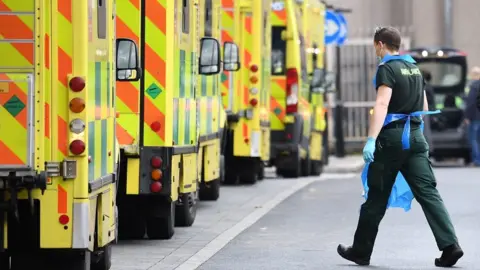Covid-19: NI facing most difficult winter ever, says Swann
 Stefan Rousseau/PA Wire
Stefan Rousseau/PA WireNorthern Ireland is "facing into the most difficult winter ever experienced", Robin Swann has warned.
The health minister said there were "unscheduled pressures" facing the health and social care system.
Earlier, Naomi Long said she feared relaxing rules on face coverings in nightclubs may cause a "significant" rise in the transmission of Covid-19.
The justice minister said she was concerned about a "lack of clarity" in health advice.
On Thursday, the executive agreed people will not need to wear masks while dancing in nightclubs when they reopen next Sunday.
Social distancing laws in hospitality venues will also be scrapped.
However, Northern Ireland will not be following England and Wales in easing rules around testing for Covid-19 after international travel.
From Sunday, those returning to England will only be required to take a lateral flow test after their arrival but those returning to Northern Ireland will still be required to pay for a more expensive PCR test.
Any decision to move to lateral flow tests will require executive consideration and agreement.
'Operating above capacity'
In a written ministerial statement on Friday, Mr Swann updated assembly members on the pressures facing the health service.
"Over this summer and into the autumn, the Northern Ireland hospital system has consistently been operating above capacity, with many patients waiting on trollies for admission," he said.
"This situation is unheard of during the summer months and is an indication of the scale of unscheduled pressures likely facing the HSC system this winter."
Mr Swann detailed funding he had assigned to help support the system, saying he had tabled a bid for an additional £30m from the October monitoring round to add to the £31.5m secured in the June round.
 PAcemaker
PAcemakerIt is understood Ms Long and Infrastructure Minister Nichola Mallon both raised concerns about the changes to Covid restrictions at Thursday's executive meeting.
In a letter to her executive colleagues, obtained by BBC News NI, the justice minister warned that the impact on messaging around the wearing of face coverings could have "potential unintended consequences".
She added: "Given the extent of Covid transmission in the community, the risk posed by new variants and the high risk nature of nightclub settings, I fear that further relaxation in the wearing of face coverings, particularly when dancing, may lead to a significant increase in transmission."
Ms Long said she recognised making changes to allow people to stand to eat or drink without masks was "necessary", but said that with such relaxations it would be "practically impossible to maintain high levels" of enforcement.
The justice minister said she believed that as a result of the changes, it would be hard to justify "continued requirements to wear masks in other lower risk settings as a consequence".
She also repeated her view that proof of full vaccination and testing should be "mandatory" requirements in high-risk environments such as nightclubs.
 Getty/Flashpop
Getty/FlashpopIt is understood that work by Stormont's Department of Health on developing a vaccine passport digital system is "well advanced".
But Ms Mallon has said the executive was told if ministers agree to make the scheme mandatory, it could take five to six weeks to put in place the legislation enforcing it.
She said she was concerned that action from the executive would again be "too little, too late".
"We don't have five to six weeks, we need to be implementing it quickly so that when we need to, we can move on this," she said.
"I voted against reopening hospitality and nightclubs without mandatory passports… we should have this in place, we know vaccines help to protect us.
"You need to ask other ministers why they don't share that viewpoint in the face of overwhelming evidence."
Dr David Farren, the chair of the British Medical Association's (BMA) Consultants Committee said the the Executive's decision is "madness".
"I was quoted earlier this week as saying that I haven't seen a health service as busy as this in my 20 years of practice. I stand by that," he told BBC Radio Ulster's Talkback.
"I don't care if people think we are scaremongering. The reason we are highlighting the data and the cases that are there at the minute is because we don't want to see this fall over.
"What happens if the health service gets overwhelmed, frankly, is that people will die."
On Thursday, First Minister Paul Givan said Northern Ireland was going to be able to "move forward" with further easing.
"We continue to monitor the way in which transmission is spreading, but also the way in which it is spreading in hospitals," he said.
"But nobody wants to go back to what we had before. There are consequences with lockdown, people's mental health and cases of domestic violence that took place.
"Lockdown is not a solution without consequences - it has very serious consequences, and we all want to avoid that."